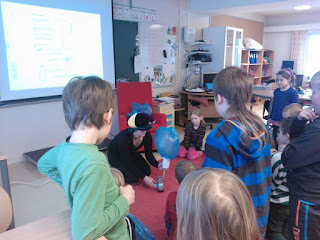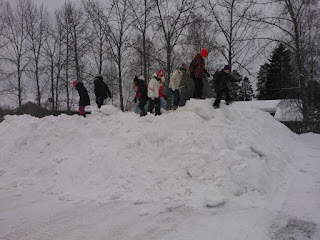The Star of
Australia - Australia Board Game Project, 6th Grade
Mr Timo
Fordell, 5th grade teacher
Mrs Sanna Kokko, 6th grade teacher
Mrs Hanna Kukkonen, English and German teacher
Mr Rodrigo Hernanz de Salas, assistant teacher of English
Photos: Mr Rodrigo Hernanz de Salas
Mrs Sanna Kokko, 6th grade teacher
Mrs Hanna Kukkonen, English and German teacher
Mr Rodrigo Hernanz de Salas, assistant teacher of English
Photos: Mr Rodrigo Hernanz de Salas
The 6th
grade students have now completed their Australia Project. This year the
traditional Australia project was a board game project, which was linked to our
school’s entrepreneurship project. The difference was that we didn’t have any
outside subsidiaries in our project.
Mr Timo
Fordell had executed a board game project last year. He gave us invaluable tips
and advice before and during the project.
The
subjects integrated in this project were geography, biology, Finnish, English
and art.
Students were first divided into small groups. They were also seated into these groups in the class room.
The aim of the project was to create a board game on Australia which should be part English part Finnish. The groups could decide how big a role English should play in their game. The goal of the project was to learn about Australia but also to learn new things using integration of different subjects and co-operative learning.
Students were first divided into small groups. They were also seated into these groups in the class room.
The aim of the project was to create a board game on Australia which should be part English part Finnish. The groups could decide how big a role English should play in their game. The goal of the project was to learn about Australia but also to learn new things using integration of different subjects and co-operative learning.
The first
step was to find information about Australia in students’ own study books. The
students’ assignment at home was to write keywords and key questions in their
notebooks. In the notebooks the students had a Finnish and an English page.
The second
step was to find information in other than study books. We have quite a large
collection of books on Australia in our own library and in addition to those Mrs.
Kokko ordered a wide range of books on Australia both in Finnish and in English
from our local library.
The third
step was to search for information on the internet.
All groups
had to find information on basic topics e.g. nature and vegetation, animals,
inhabitants/population, history, weather and basic facts on Australia and on
one voluntary topic (e.g. sights, sports, music etc.). The home assignment was
to find as much information as possible about the voluntary topic.
The fourth
step was to invent and plan the board game in which all the information
gathered could come to use.
The project
lasted almost 4 weeks.
The
teachers will evaluate the project. The main targets of evaluation will be
commitment to work during the task, creativity, co-operation and the final
result.
Things to
improve next time will be the following: test playing the games in an earlier
stage and test reading the game instructions by other students in course of the
work. This time some of the games lacked good and thorough instructions which
were hard to correct because lack of time towards the end of the project. When
one wanted to develop the project even further one would want to give more time
to cultivating the games even further by making fancy dice and fine pawns to
the game.
Irregular
verbs and writing a blog - English homework during the project
The students
home assignment for this period was to learn 10 irregular verbs for each lesson
(all three forms) and write a blog of two days of the week (we have two 45
minutes English lessons in a week). In Finland the 6th grade
students are required to learn only the base form and the simple past form of
irregular verbs. In our school we have also learned the past participle forms
of the verbs in order to make further studies easier. Some of the students even
wanted to learn the 7th grade verbs - that is significantly more
than the verbs that are required in the 6th grade. The majority of
the students learned 80 verbs during the project.
For the
blog writing we used kidblog.org which allows the teacher to view and edit the
blog texts before publishing. As this was the first time we used open internet
viewing of the blogs (we have used closed internet environment before) I
decided to use quite an unorthodox method in publishing pupils’ texts. The
pupils sent their texts to me and I made some corrections. Pupils were then
advised to read their texts before writing new posts. This worked astonishingly
well – most of the students learned from their errors and their posts got
better and better by the time even though they didn’t correct their grammar and
spelling themselves.
Many pupils got really keen on writing – apparently the fact that anyone could read their posts made the task much more interesting to them. If you want to have a peek at the blogs please click the following address: http://kidblog.org/6thGradePothill/
Many pupils got really keen on writing – apparently the fact that anyone could read their posts made the task much more interesting to them. If you want to have a peek at the blogs please click the following address: http://kidblog.org/6thGradePothill/














.jpg)
